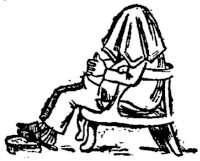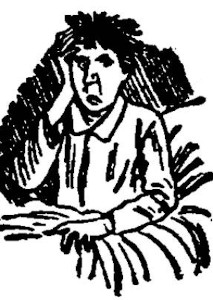This article has been transcribed from a copy of the Cardiff Times in the online collection of scanned Welsh newspapers 1804-1919 in the National Library of Wales, with grateful recognition of the free access accorded to all readers. Paragraph breaks have been introduced for easier reading.
Explanatory Notes
‘[A]ll in a morning early’ comes from a traditional Scottish ballad ‘The laird o Drum is a hunting gane’.
‘[R]estless fiend’ is from Shelley, ‘To the Emperors of Austria and Russia’ l. 21.
Nepenthe is an ancient Greek sleeping potion.
Morpheus is the Roman god of sleep and dream. —David Skilton

arly to bed, and early to rise, makes a man healthy, wealthy, and wise,’ says the old saw, but, like a few other ancient maxims, it requires to be taken not a little cum grano salis [with a grain of salt]. I have heard it rendered, ‘Early to bed, and early to rise, sets a man yawning, and bungs up his eyes,’ and there's a good deal of truth about it. Does even the prettiest woman in the world look anything but limp, blear-eyed, depressing, and dowdy ‘all in a morning early?’ Why, certainly not. When she starts by an early morning trip, say, does not her very hair seem to become dank and out of curl, however carefully she may have dressed it ere starting? Trust me, the young woman who can look even decently passable a few hours before breakfast time must be a heaven-born beauty – the very Goddess of Morn herself. Regarding the serious rhyme, in the ‘healthy and wealthy and wise’ touch, I beg leave to say that I have known scores of men who were both early to bed and early to rise – to rise from their beds, that is – who were by no means either wealthy or wise; indeed, I shouldn't mind betting that nine out of ten of the wealthy and wise of this country neither go to bed early nor rise in particularly good time, nor ever did. A wise man never would get up particularly early (except in a metaphorical sense) because he would know that he wouldn't be a bit of good for real work if he did, and because he would realise the fact that he would be stretching himself and nearly dislocating his jaws all day. There's a fearful lot of humbug about these old saws, and I can fully fancy that the antediluvian frauds who first conjured them up must have chuckled hugely to think how readily people accept them – mainly on account of their jingle, and because it is always well for a man to know a few moral aphorisms off by heart to reel off when necessary. Take the ‘healthy’ clause in the saw I have been reviewing. Is the early-rising maniac who goes out every morning before breakfast for a walk, winter and summer, any more healthy than the jovial man who never thinks of getting out of bed before ten? Does his early morning stomach-ful [sic] of cold air do him any good? Does a dismal tramp, when nature herself seems hardly awake, inspire in him any precious thoughts that might not have been greatly improved upon had he ‘thunked’ between the sheets? Certainly not. All that he sees in the morning are half-somnolent workmen grumblingly hurrying off to work, and policemen going off their beats after their customary morning pint – people, in fact, who, at that hour, scarcely think that life is worth living. It seems inconceivable, sir, to me that any man who is not forced to get up in the early morning ever should do so, and I should hold that about the mental organisation of such a man there is some species of defect – and I ought to know, for I am possessed of the very demon of unrest myself, and am writing these very words at 4.50 a.m., which is rather early for a literary man. You should see working men stare at me when I Iazily lounge about smoking in the early morning; they palpably think me a fool for not being comfortably tucked up in bed – and I'm pretty certain they are right.

‘Don’t get through much work, eh? Yawning all day – well, the guvnor shouldn’t bring me to the office so early.’
What a heap of saws – wise and unwise – there are about sleep. There is that one which has been fathered upon quite a host of geniuses of one decade or another, which affects to classify men by the duration of their slumbers – ‘eight hours for a fool’ and so on. No one knows precisely who did give vent to this illogical rubbish, but, whoever he was, he was an ass. My earnest advice in regard to sleep to all men and women is similar to that of the Scotchman about the whisky, ‘Take it whenever you can, and as much of it as you can get.’ Good old William Spokeshave, of Stratford-on-Avon, had a fine notion of sleep, and I can well believe that he never demanded his shaving water till at least 10.30 a.m. daily and every day. He has some very pretty names for sleep, has William. ‘Nature's soft nurse’ he calls it [2HenryIV.III.i.6]; he speaks about its taking up the ‘ravelled sleeve of car’ (or something like that [Macbeth II.ii.35]; accuracy of quotation by no means guaranteed; don't want to go rummaging about for the book lest I should wake the whole house), and it is evident that William knew what a bad night was (possibly on account of an unpaid Improvement Rate or the fact that Mrs Shakespeare had the toothache), for in one passage he gets on reproaching the ‘dull god,’ as he calls Mr Morpheus, and asks the latter a conundrum something to this effect, ‘Canst thou give thy repose to the wet sea boy in an hour so rude, and, in the calmest and most stillest night, with all appliances and means to boot, deny it to a King?’ [2Henry IV III.i.15 and 26-30]. Then who can ever forget about Mr Macbeth, who did ‘murder sleep,’ [Macbeth II.ii.40] he tumbled about so, seeking out the cold corners of the bed because of that little affair he had with Messrs Duncan and Co., who, not content with having the worst of it with cold steel, would turn restlessly in their graves and take ghostly promenades. Truly the Bard must have been a sleep-round-the-clock, never-get-up-till-I'm-forced sort of man -- like the all-wise fellow that he was.

Ask this gnetleman (when he wakes) what he thinks of the virtues of ‘napping.’
I have come to the conclusion, sir, from long experience, that the hardest person in the world to arouse from sleep is the average maid-of-all-work. Bells, yells and ‘buzzers’ can scarcely do it. Through the crash of thunder; through the din of battle – battle raging at her room door; the crash of alarums; through the howls of a demented master and the shrill adjurations of an irate mistress, she will calmly slumber on, and when at last partially disturbed by means of a battering-ram at her door or a violent dig in the ribs from her mistress, she will calmly inquire, ‘Were you (big yawn) calling me, m'm?’ Well, she is wise in her own generation [Luke: 16.8] – she takes as much sleep as ever she can get; and it is quite on the cards that when she marries ‘that young man’ and settles down in that humble home of her own, to which she is so eager to fly, the daily cares of life will hardly let her sleep as she does now.

Bother their sleep-producing systems; here I’ve counted up to about seven millions; it’s 4.30 now, and I’m still awake.
How infinitely ridiculous, sir, are the majority of the hundred and one supposed methods of obtaining sleep recommended to those who lie awake at nights. I have tried dozens of them – and ghastly failures they were. I have counted unheard of numerals in bed till I was brain sick – and more restless than ever. I have done the most elaborate sums in arithmetic, I have said whole volumes of poetry backwards way, I have repeated one set phrase over and over again till day-break – but all to no purpose; the restless fiend within me has been as active as ever. And under such conditions, how one does envy the man who can lie down and sleep away at will, like a lot of slumbrous [sic] people whom I knew of. Such a gift is one of the happiest that one can be endowed with. ‘Begone creditors, begone petty cares, begone considerations for to-morrow, begone this narrow sphere,' such a man must say; 'let me to the land of "Nod," let me to the great dreamland, to sweet oblivion, to kind nepenthe.' The much ‘bossed’ clerk who rushes off in a morning chewing his toast and buttoning one cuff in a mad race to be at his place of business by nine o'clock, ‘cusses’ his ill-luck in having overslept himself, but I trow well that he is a luckier man by far than is he upon whom that jumping-Jack fiend Insomnia has set its mark. I have come to the deliberate conclusion, sir, that the sweetest realm on this earth when one call sleep at will is bed. Friends may fall away; entertainments may begin to cloy; the girl of one's heart may begin to seem no means all that one's fancy painted her – never mind, one can go and sleep it all off, and old ‘Scratch’ [Satan] take the hindmost. Who minds being called a sluggard? No wise man, I should think. Who cares about the asinine people who will insist upon tying one down to their own set rules and rousing one up morning by morning at the same hour[?] A man sometimes can eat twice as much dinner as at others – why shouldn't he, when he feels inclined, and can afford to do it, take twice as much sleep on one morning as on another; and yet there are people who say, ‘Oh, we breakfast always at 8 o'clock; I suppose that will suit you?’ Yes, perhaps on one morning; but give me Bohemian irregularity – let me breakfast as I have done this morning, at 5.15, or let me, if I can sleep as long, remain in the sheets till noon, and breakfast then. Good old sleep, what a frightful lot of silly condemnation is heaped upon those who worship you during the daytime – one so attractive as thou art doth ever by night or day demand homage. Hi! charge your glasses; here's to the afternoon ‘nap,’ here's to a twelve hours' slumber, here's to a good old drowsy Morpheus – here's to bed.
Last modified 14 May 2022